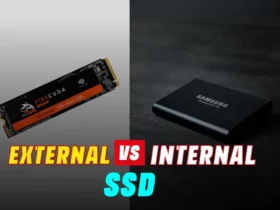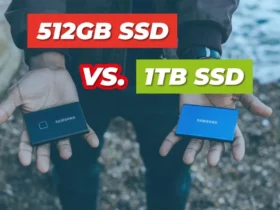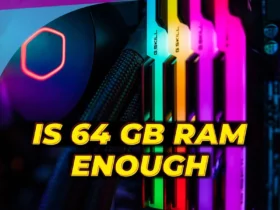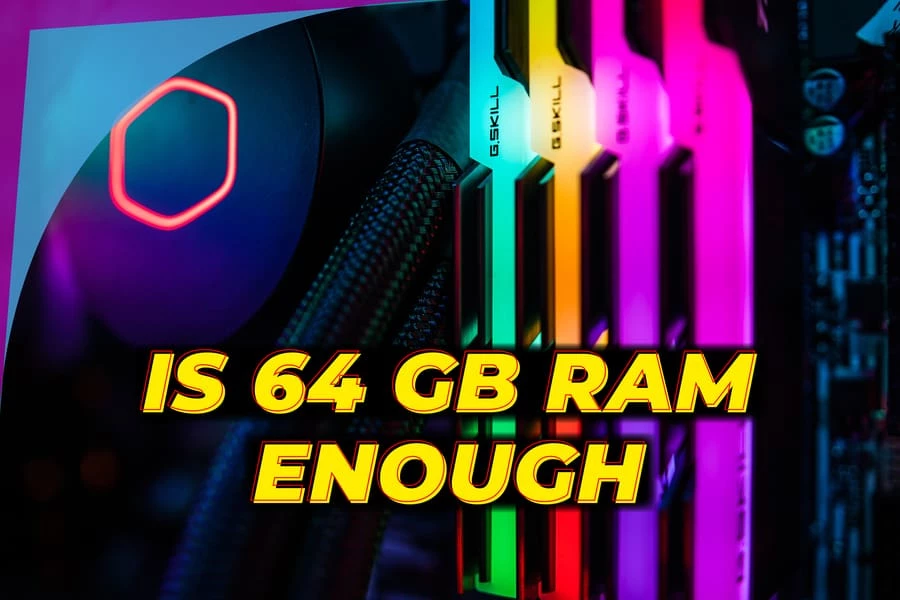In today’s digital age, having a high-performance computer is essential for many users. One of the critical components of a powerful machine is its RAM. While 8 GB or 16 GB RAM used to be considered sufficient, the bar has been raised with 32 GB and 64 GB options now available.
But is 64 GB RAM necessary, or is it overkill? Let’s explore this question and find out.
Is 64 GB RAM Enough?
While 64GB of RAM may seem significant, whether it is enough depends on the specific use case. The amount of RAM (Random Access Memory) a computer needs depends on several factors, such as its intended use, the operating system it runs, and the type of software and applications running on it.
For most everyday computer users, 64GB of RAM is likely overkill. Typical users browsing the web, streaming video, or performing basic office tasks can get by with much less, typically 8-16GB. However, for users who are into high-end gaming, video editing, or 3D modeling, 64GB of RAM may be necessary to ensure smooth performance and avoid lag.
Professional content creators and video editors often work with large files and require a lot of processing power to handle multiple tasks simultaneously. This is where 64GB of RAM becomes necessary, as it can help speed up the rendering process, reduce load times, and allow for efficient multitasking.
Similarly, gamers who play modern games with high-quality graphics and big open worlds often require more RAM to ensure smooth gameplay. Some games, such as Microsoft Flight Simulator, recommend a minimum of 32GB of RAM to run smoothly, while others recommend even more.
64GB of RAM is often necessary for users who run virtual machines. Virtual machines allow users to run multiple operating systems on one computer, which can require a lot of RAM to ensure each system runs smoothly.
Additionally, servers and workstations used for high-performance computing, such as machine learning or data analysis, often require large amounts of RAM to handle massive amounts of data and perform complex calculations.
In conclusion, 64GB of RAM is a significant amount of memory, and for most everyday users, it is likely overkill. However, for users who require high-performance computing, such as content creators, gamers, or those running virtual machines, 64GB of RAM is often necessary to ensure smooth performance and efficient multitasking.
Is 64 GB RAM Sufficient For Everyday Use?
64 GB RAM is more than sufficient for everyday use for most people. In fact, most computer users will not even come close to utilizing that amount of memory. RAM, or Random Access Memory, is used by your computer to store data currently used by your operating system and applications. Having more RAM allows your computer to access and use data more quickly, which can lead to better performance.
For basic everyday tasks such as web browsing, email, and word processing, 4 GB to 8 GB of RAM is typically sufficient. However, suppose you frequently use memory-intensive applications such as photo or video editing software or are a heavy multitasker with multiple applications open at once. In that case, you may benefit from having more RAM.
In addition, 64 GB of RAM may be overkill for most games if you are a gamer. While some modern games require significant memory, even the most demanding titles typically do not use more than 16 GB of RAM.
It is worth noting that while having more RAM can improve performance, it is not the only factor that affects overall system performance. The speed and type of your computer’s processor, the quality of your storage device, and the efficiency of your operating system all play important roles.
In conclusion, 64 GB of RAM is likely more than enough for everyday use unless you have specific needs that require a large amount of memory. However, suppose you are unsure about your specific needs or considering using your computer for more demanding tasks in the future. In that case, consulting with a professional or doing additional research may be worthwhile to determine the ideal amount of RAM for your particular use case.
How Does 64 GB RAM Compare To Other RAM Sizes?
RAM (Random Access Memory) is an essential computer system component, allowing it to access and process data quickly. The amount of RAM a computer has can affect its overall performance and capability, and 64 GB of RAM is a significant amount of memory that can provide high-speed access to large amounts of data.
Compared to smaller RAM sizes such as 8 GB or 16 GB, 64 GB RAM is several times larger and significantly increases processing power. With 64 GB of RAM, a computer can handle more demanding applications and multitask without experiencing slowdowns or crashes. This makes it ideal for professionals with large data sets, video editing, graphic design, and other resource-intensive tasks.
Compared to higher-end RAM sizes, such as 128 GB or 256 GB, 64 GB RAM may not offer the same level of performance. However, it is still considered a powerful and capable memory, providing an excellent balance between performance and cost. For most applications, 64 GB of RAM is more than sufficient, and only specialized tasks that require massive amounts of data processing may require more.
It is worth noting that while RAM size is a critical factor in a computer’s performance, other factors such as the CPU, GPU, and storage also play a significant role. A computer with 64 GB of RAM but a low-end CPU or storage may not perform as well as a computer with lower RAM but better hardware components.
In conclusion, 64 GB of RAM is a powerful memory that provides excellent performance for most applications, making it a popular choice for professionals and enthusiasts. While larger RAM sizes exist, 64 GB balances performance and cost, making it an excellent choice for most users.
Can Too Much RAM Be Detrimental To Performance?
Having too much RAM in a system is not detrimental to performance. However, it can lead to other issues that can affect performance. For instance, if the system has more RAM than necessary, it may result in slower boot times and application load times since the operating system will take longer to manage and allocate the additional memory.
Moreover, having too much RAM can increase power consumption and generate more heat, negatively impacting the components’ lifespan and overall system stability. Additionally, if the RAM speed or latency is not optimized for the system, having more RAM may not improve performance as much as expected.
In summary, while having too much RAM in a system may not directly harm performance, it can lead to other issues that may affect overall system performance and stability if not properly optimized. Therefore, it is essential to ensure that the amount of RAM is adequate for the system’s needs and that the RAM speed and latency are optimized for maximum performance.
Future-proofing Your Computer With 64 GB RAM
In today’s world, technology is evolving at an unprecedented rate. As such, it’s important to ensure that your computer is future-proofed to remain relevant. One way to do this is by upgrading the RAM to 64 GB.
RAM, or Random Access Memory, is an essential computer component that allows it to run multiple programs simultaneously. As technology advances, software programs and applications become increasingly complex, requiring more RAM to run efficiently. Upgrading to 64 GB of RAM allows your computer to handle even the most demanding tasks easily.
A 64 GB of RAM computer is especially important for professionals working with resource-intensive applications such as video editing, 3D modeling, and scientific simulations. These applications require large amounts of memory to run smoothly and having insufficient RAM can result in slow performance and crashes.
But even if you’re not a professional, having a computer with 64 GB of RAM can still be beneficial. It will allow you to multitask without any slowdowns, and you won’t have to worry about closing programs to free up memory. Additionally, it will ensure that your computer remains relevant for years to come, as it can handle any future software requirements.
Upgrading to 64 GB of RAM is not cheap, but it’s an investment that will pay off in the long run. It will save you the cost of replacing your computer in a few years when new software requires more memory. Furthermore, it will improve the overall performance of your computer, making it faster and more responsive.
In conclusion, upgrading your computer’s RAM to 64 GB is an excellent way to future-proof it. It will ensure that your computer can easily run even the most demanding applications, making it more responsive and faster overall. While it may be expensive, the investment will pay off in the long run by saving you the cost of replacing your computer in a few years.
Conclusion
In conclusion, whether 64 GB RAM is enough depends on the user’s specific needs and usage. For most individuals and even some professionals, 64 GB should be more than sufficient for their computing needs.
However, more RAM may be necessary for users with highly demanding workloads such as 3D modelling or video editing.


















Leave a Reply